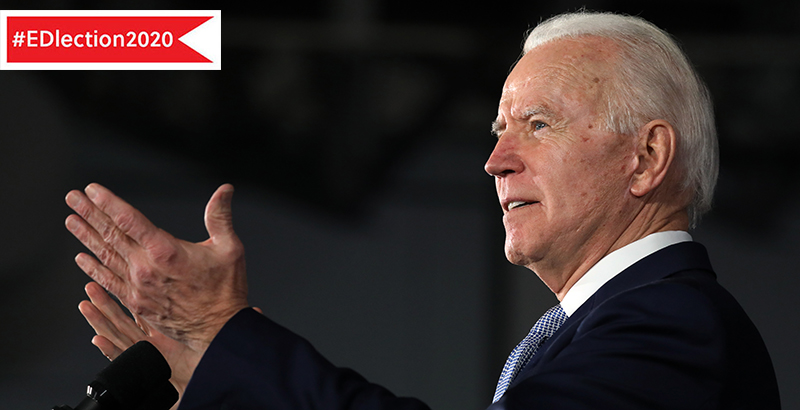Jeffries: From Title I to Aid for Students With Disabilities to Educational Opportunity to Free College, Biden Is the Clear Choice for Reformers

For education reform advocates, there’s one clear choice on the ballot this year: former Vice President Joe Biden.
Biden would triple Title I funding for schools serving students from low-income families — adding a historic $32 billion to the program’s annual budget for our nation’s most vulnerable young people. This is especially important given the ways in which resource inequities are accelerating because of the pandemic.
Education inequity is rooted inextricably in investment inequities, and these dollars would finance increases in teacher pay, instructional materials and wraparound services for schools serving students from low-income families. Because Title I is the primary federal funding mechanism for addressing the yawning resource gaps differentiating wealthy school systems from low-income ones, Biden’s investment in this program would be a powerful step toward narrowing the opportunity gaps facing low-income schoolchildren.
In addition, Biden has pledged to fully fund services for students with disabilities under the Individuals with Disabilities Education Act. In 2018-19, the federal government covered less than half of its promised funding under IDEA, leading to strains on local property taxes and undermining the quality of education services to some 7 million students across our nation who receive special education services.
On higher education, the vice president’s plan seeks an unprecedented breakthrough in college access by making public college debt-free for all low-income and middle-class families. Biden would double the maximum value of Pell Grants, make two-year colleges’ tuition and fees free for everyone, regardless of income, and make four-year college tuition and fees free for students whose families earn less than $125,000 a year.
Moreover, recognizing the essential role that minority serving institutions play in providing educational opportunity for students of color, Biden proposes a record $70 billion investment in historically Black colleges and universities.
To be sure, there are areas where we’ll need to push Biden. While he has expressed support for high-quality nonprofit public charter schools, the rhetoric in the Biden-Sanders Unity platform is largely hostile to public charters and nowhere acknowledges either the data showing that public charters have generally provided quality educational options for low-income students, or the fact that supermajorities of Black and brown families embrace those options. Similarly, the platform language is largely bearish on standards and accountability, despite the importance that annual assessments, disaggregated by subgroup, have played in compelling states and districts to ensure that all students, including low-income children, make adequate learning gains each year.
Still, on balance, Biden’s commitment to triple Title I funding, to fully fund the IDEA, to make college affordable for low- and middle-income families, to make historic investments in minority serving institutions and his openness — even if not as overt as we would like — to invest in innovative school options, stands in stark contrast to the disinvestments in public education made by the Trump administration.
Earlier this year, President Donald Trump proposed cutting the U.S. Department of Education’s budget by nearly 20 percent, while rolling funding for nearly all the department’s programs into one block grant. The grant would eliminate dedicated funding for Title I and the federal Charter Schools Program, while budget cuts would do away with Pell Grants completely.
The Trump administration failed to enforce key provisions of the bipartisan Every Student Succeeds Act on many fronts, including by approving state plans that violate requirements for annual statewide assessments for all students and the setting of clear goals to close opportunity gaps for students from historically disadvantaged groups.
The Trump administration has routinely undermined students’ civil rights. Education Secretary Betsy DeVos rolled back the department’s regular practice of probing civil rights complaints for evidence of larger, systemic violations, including those related to racial harassment or disciplinary discrimination. DeVos limited Title IX protections, creating barriers for survivors of sexual assault on college campuses to seek justice, and rolled back rights for transgendered students.
Last spring, the Trump administration moved to deregulate quality assurance in higher education. That should come as no surprise from Trump University’s namesake, but it nevertheless puts millions of students in harm’s way — especially as the for-profit college industry that already has harmed so many.
So, even if the election came down only to policies affecting public schools, Biden is plainly the better choice. But we also know that our children do not drop into our schools from the sky. Rather, they are situated in families and communities, and the health of their families and communities is inextricably connected to their capacity to be well educated. The choice is clear, too, in the context of the candidates’ competing priorities on these intersectional issues.
Trump has proposed draconian cuts to affordable housing programs, health care and social services. He’s worn thin the community safety net that supports our young people. He has proposed cutting the Supplemental Nutrition Assistance Program that rounds out food budgets for low-income families. Just last week, federal courts struck down Trump’s attempt to end food stamps for 700,000 unemployed Americans — in the midst of a pandemic. He’s sought to invalidate the Affordable Care Act and cut federal spending on Medicaid. His budgets have proposed cutting funding for job training programs by 40 percent. Actions speak louder than words — and Trump’s actions have shown a clear disinvestment in communities that need investments the most.
And, as if his explicit policy actions weren’t enough, Trump’s a cultural arsonist, consistently pitting one group of Americans against another and, even more, actively undermining and even ridiculing affirmative efforts to acknowledge and reverse racial inequities affecting families of color. He opened his campaign by lambasting Mexican immigrants as “rapists,” then went further by separating Hispanic immigrant children from their parents at the border — officials are still unable to locate the parents of more than 500 children — placing toddlers in cages and seeking to deport Dreamers. He sought to ban immigrants from entering the country from majority-Muslim countries; he claimed immigrants from Haiti and sub-Saharan Africa were from “shithole countries” and should be banned in favor of immigrants from nations like Norway; and he said minorities and low-income families were “ruining” the suburban American Dream. And this is a mere sampling of the ways in which Trump has consistently sought to antagonize rather than heal our cultural divides.
On education policy, the choice is clear; on intersectional policies affecting the families and communities that anchor our children, the choice is clear; and on integrity, character and leadership, particularly on issues of equity for cultural minorities, the choice, too, is clear.
Biden will make historic K-12 and higher education investments that have the potential to narrow opportunity gaps in unprecedented ways. He will invest in the safety net supporting our families and communities, and he will work to heal a polarized country and signal that all communities are welcomed and embraced.
We will have to continue to push Biden for more affirmative efforts to embrace innovative practices, including public charter schools, and to hold the line on accountability. But, on balance, there is only one credible choice for a president who will fight for equitable educational opportunities for children who for too long have been denied it, and that’s Joe Biden.
Shavar Jeffries is president of Democrats for Education Reform and Education Reform Now.
Get stories like these delivered straight to your inbox. Sign up for The 74 Newsletter

;)
